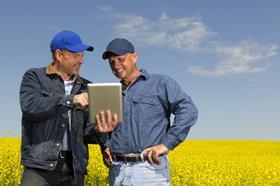
Traceability has been a buzzword in the grocery industry since the Horsegate scandal.
While fruit and vegetables may not have been directly implicated in that watershed moment, traceability is nonetheless vital in a climate where consumers are now more mindful and inquisitive about what they eat.Responding to this need, in a form of technology that has become ubiquitous, is LiveTrace.
Designed by people working in agriculture, LiveTrace’s ‘first-of-a-kind’ cloud computing software package uses photos taken at field level to track the entire supply chain.Having taken the photo of a field using the LiveTrace app, growers can then enter the co-ordinates of the location into the cloud computing space to generate a container-specific QR code.
Others in the supply chain – including retailers – can then access the information and track a specific container on its journey throughout the rest of the chain.Jon Kemp, of LiveTrace, says: “Traceability is now more than ever a default requirement in the food chain for the customer, but for the grower, the information collected can be used to spot trends and reduce costly inputs such as fertiliser.
“We have made considerable efforts to make the app very user friendly, working on the basis that the easier it is to use, the more it will be used. And so far, farmers and other users have found it reliable, intuitive and simple to use.”
In the highly-demanding and competitive supply chain, the need to deliver high-quality fresh produce – against increasingly tightening deadlines and at reduced prices – is taxing the ingenuity of even the most efficient suppliers.Accordingly, the ability to access and share real-time information is essential. This is where Linkfresh, a leading Enterprise Resource Planning (ERP) software specialist, steps in.
The company’s CEO, Robert Frost, says: “Our ERP software provides the fresh produce industry with a constant and up-to-date flow of information. It can give growers and suppliers the ability to manage every aspect of the supply chain, including production, forecasting, planning, inventory management, quality, full traceability and logistics.”
Linkfresh – which works with G’s Fresh, Produce World and QV Foods, among others – is planning to roll out its cloud-based ERP product later this year.Frost notes: “There is a demand for cloud-based ERP solutions, and we’ve been speaking to growers and suppliers in the fresh produce industry to ensure we design a solution which fits the industry’s specific requirements.
“Using ERP software as a service (SAAS) via the cloud means growers and suppliers can plan required SAAS usage based on business forecasting and ensure they have the correct capacity in place.
“This is absolutely vital in a seasonal business where, for example, packhouses may be opened to meet seasonal demands and then mothballed again after just a few months once the peak in demand has passed.”
As for what the future holds, Frost, crystal ball-gazing, suggests: “The use of the cloud and mobile devices will increase, and so software will continue to develop seamless integration with these devices so this information can be accessed as it happens, for example, on the shop floor, or out in the field.
“Even when WiFi connection isn’t available, such as in a coldstorage facility or out in the field, tablets, iPads and smartphones will be able to store the data and upload it as soon as a WiFi connection is detected, meaning data collection can continue uninterrupted.”
And to think it wasn’t even that long ago that paper and pens were the status quo.



